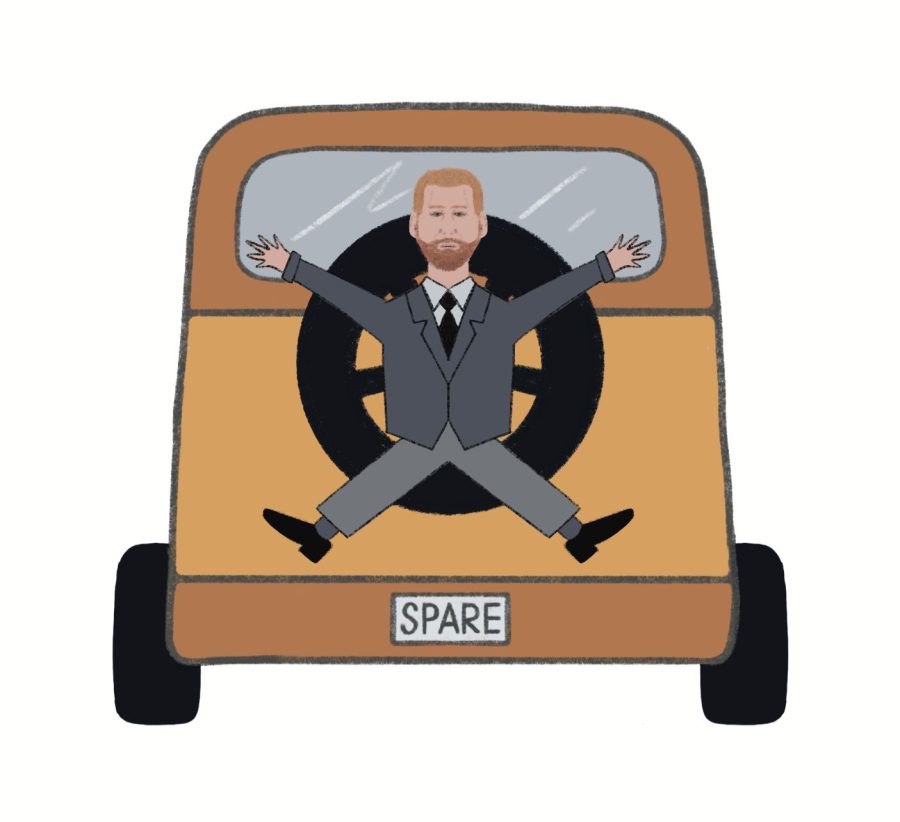It seems like Prince Harry and his wife, Meghan Markle, haven’t been out of the news for the past few years. First there were all the allegations of racism, then the two stepping back as senior members of the Royal Family, then the Oprah interview and now Prince Harry’s tell-all memoir “Spare.”
And like almost everything related to the couple, the book immediately provoked a firestorm of reactions, some less favorable than others. The book also contained an unprecedented number of allegations against members of the British Royal Family, which made Harry either a hero or public enemy number one, depending on whose side you’re on.
Putting the media circus aside, the book isn’t nearly as juicy as people seem to think. Sure, there are moments where I think I could’ve done without a slightly excessive amount of visual detail, but as a whole, the work is more of a reflection on his life and his family, described in unparalleled detail.
If you ever find yourself wanting to know more about Harry’s life or what it’s really like to be a part of the Royal Family, the book is probably your best bet since members of the Royal Family generally don’t give interviews or talk about their personal lives. In fact, it’s probably the most comprehensive narrative written about a royal.
Throughout the book, Harry’s raw emotions are displayed, including his description of the despair of having no purpose –– I especially appreciate him openly writing about his mental health and his decision to see a therapist.
Most pointedly is the racism against his wife. Harry describes the frustration the couple endured as his family repeatedly failed to protect his wife from biased media reports, like the infamous bridesmaid dress fiasco, which he says was motivated by racism.
Yet many people have heard about the book because of its explosive claims against members of his family, especially the accusation against Harry’s mother-in-law, Camilla. I’m sure all of you have heard about her infamous affair with Charles while he was still married to Princess Diana. As a result, Camilla was deeply unpopular with the British public after Diana’s death in 1997. So, Harry alleges, the Queen Consort struck a deal with the largest British tabloids where she would feed them false stories about William and Harry in exchange for positive press coverage.
I find this possible, though unlikely. I’m sure Charles did pull some backdoor shenanigans with the British press so they’d treat Camilla better; however, a full-blown conspiracy (especially with William and Harry thrown under the bus) seems unlikely. But who knows? And that “who knows” is the most damaging part of this book for the British Royal Family, because even though they supposedly have God’s right to rule, they must actively campaign every day. Not for votes, like politicians, but for popularity. Because even though the monarchy claims God’s right to rule since they officially head the Church of England, the legitimacy of the current monarch is based on nothing more than popularity. The monarch no longer wields political power, and the entire institution is essentially at the whims of popular support. So you can imagine why Harry’s startling allegations that paint the entire family as cruel, scheming and malicious can produce so much harm.
We live in the 21st century, where people are more aware and sensitive about social issues. And though the Royal Family’s popularity in the United Kingdom hasn’t suffered as much as some have predicted and a majority of the UK remains supportive, the approval ratings of Charles, Camilla and William have dropped significantly.
So maybe the book is the beginning of the end for the Royal Family, or maybe it’ll be just another blip in the family history, just like the fiascos surrounding Edward VIII or Princess Diana. But given the increased public awareness of issues like racism and mental health, and that the Royals have already been suffering from PR issues in these departments, it won’t be rainbows and unicorns for them anytime soon.
Since its publication, “Spare” has become fodder for comedians, who see it as nothing more than an immature child complaining. “The Onion,” a satirical news source, ran the mocking headline “One Time I Was In England And I Was A Prince And My Mom Was Diana And She Died And My Family Is Mean And My Wife Is Brown And I’m Sorry I Wore A Nazi Uniform” to summarize the plot. (The last part is a reference to an infamous incident where Harry wore a Nazi uniform to a Halloween party).
I find these comments too harsh. The plot can get messy at times, but the ultimate narrative of “Spare” isn’t just one deserving of complaints. Rather, it’s about moving on and the pains of being caught between a changing world and an antiquated system. So if you have time, give it a read. I promise you won’t regret it, because there might never be anything like it written again.

